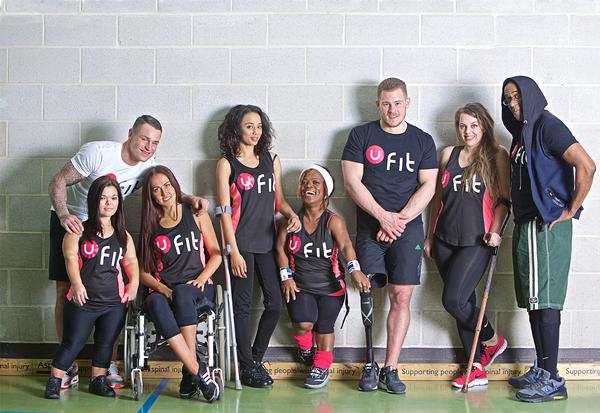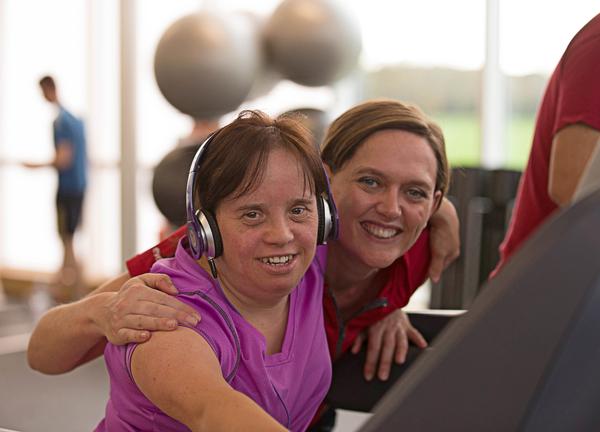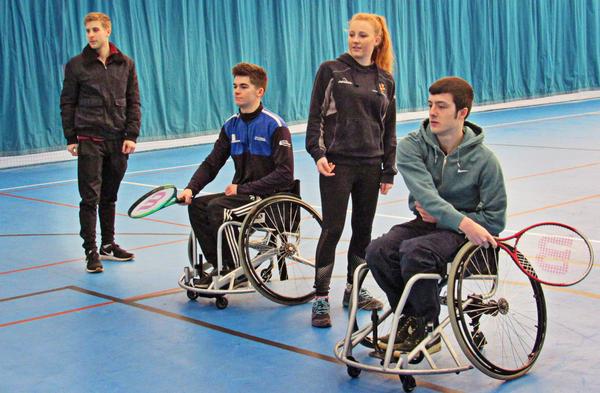



SELECTED
ISSUE
|
|
Leisure Management - Focus on inclusivity

Round-up

|
|
| Focus on inclusivity
|

As inclusivity moves higher on the agenda of gyms, health clubs and leisure centres across the globe, Lauretta Ihonor looks at the organisations going to great
lengths to make health and fitness easily accessible to all
|


UFIT is focused on improving health club accessibility and provisions for people with all types of disabilities LyonPhotography
|
|
|
|

|
Location: United Kingdom
Focus: Helping disabled individuals become fitness professionals
InstructAbility was established by the UK spinal injury charity Aspire in 2010. After noticing that Aspire’s own leisure centre attracted a high number of disabled clients due to its accessibility and use of staff with first-hand experience of disability, InstructAbility was developed. The national scheme provides disabled people with free gym instructor training and voluntary industry work placements, during which instructors strive to encourage more disabled people to use leisure facilities and lead an active lifestyle.
Funded with an initial grant of £850,000 from Sport England in 2013, the scheme has helped more than 300 disabled people qualify as fitness professionals. This, says InstructAbility’s national project manager Hilary Farmiloe, “has had a positive impact on their lives in terms of employment, independence and confidence, and has had the added benefit of disabled fitness professionals championing inclusion within their facilities”.
She adds: “Hundreds of leisure operators across the country and many organisations such as GLL, Everyone Active and Places for People have really embraced and supported the programme by offering industry work placements and leading the project at a local level.”
According to Farmiloe, InstructAbility is “in an exciting phase”. Projects currently in the pipeline include an online management system to support students and leisure operators, and a pilot programme with the Institute of Swimming, designed to encourage more disabled people to become swimming teachers.
She adds: “Once this phase completes we will be looking to set up more programmes across the country. We already have a number of leisure companies and disability organisations wanting to host a programme in their area.”
InstructAbility is currently working with the University of Birmingham to research the experiences of disabled people working in the fitness sector, and assess how industry training providers, awarding organisations and employers view disability. The initial findings are expected to be revealed later this year, followed by the publication of best practice guidelines for training and employing disabled people in the fitness industry.
www.instructability.org.uk
"Hundreds of leisure operators across the country and many organisations have really embraced the scheme" - Hilary Farmiloe
|
|
 |

Name: Universal Fitness Innovation and Transformation (UFIT) |
 |
Location: Europe and the Americas
Focus: Improving the inclusive service offerings of health clubs
Global social change movement UFIT was created in Marseille, France, in 2015 as part of a European Commission-funded project from 2013 to 2015. Its aim was, and remains, to increase fitness opportunities for people with physical or intellectual disabilities. Led by the UNESCO Chair in Inclusive Fitness at the Institute of Technology Tralee in Ireland and IHRSA, the initiative connects health clubs worldwide with local disability service providers, to assist club managers and staff in the development of the skills and knowledge required to create a practical but truly inclusive service offering. Clubs that join the initiative are given access to a wide variety of resources, including online learning units, training sessions and mentor support, to achieve the level of transformation required.
As Catherine Carty, head of the UNESCO Chair in Inclusive Physical Education, Sport, Fitness and Recreation explains, UFIT’s global programmes were developed, partly, in response to "the professional and personal opinions of many that the fitness sector could be a key player in ‘inclusivising’ sport and society”.
She adds: “The sector caters for all age groups, adapting to the needs and interests of the clients it serves. It is based in communities, for communities and its scope to respond to the inclusion call is vast.”
UFIT is currently running pilot programmes in 10 clubs across the US, Ireland and Peru. These clubs include Newtown Athletic Club in Pennsylvania, USA, which hopes to improve offerings for children with cerebral palsy and adults with multiple sclerosis; and two Atlantic Club sites in New Jersey, which have joined the pilot to improve provisions for people with Parkinson’s disease.
Kilian Fisher, IHRSA international public policy advisor and UFIT global industry lead, says: “In the last years, we have established over 50 partnerships across the globe and set up UFIT Taskforces, which are intersectoral partnerships with organisations, such as the American Council of Exercise (ACE), that aim to nationally promote the UFIT movement.
“The response from the sector has been very positive and we hope to scale in 2018 and make UFIT available to many more clubs and professionals."
www.justdoufit.com
"The sector caters for all age groups in individual and group settings, adapting to the needs and interests of the clients it serves" - Catherine Carty
|
|
 |

Name: Sport For Confidence (SFC) |
 |
Location: Essex, United Kingdom
Focus: Encouraging people with additional needs to use leisure centres and get active
As an Essex-based social enterprise, SFC works with leisure partners, such as Everyone Active, Fusion Lifestyle, GLL and Essex County Council to deliver activity sessions for people with a variety of additional needs, ranging from dementia and mental health conditions, to Down’s syndrome and autism. Not willing to accept that traditional delivery methods employed by the NHS are always the most effective way of achieving positive patient outcomes on a large scale, Lyndsey Barrett created the SFC programme, which combines the expertise of an occupational therapist with that of a sports coach to ensure that participants reap bespoke life-changing occupational outcomes.
SFC officially launched at Basildon Sporting Village in 2012, catering for a very small group of regular participants, just once a week. However, the programme has grown significantly over the last five years. Now attracting more than 500 participants across five venues each month, SFC helps participants to move from a sedentary to an active lifestyle, while reaping all the mental, social, physical and health benefits associated with increased physical activity.
Barrett says: “We’ve had an incredible response to the initiative. We are currently hosting 25 sessions every month and delivering more than 800 interventions. Most of the individuals we engage have never visited a leisure centre before and prior to our intervention were leading sedentary lives.”
She adds: “Participants have gotten so many benefits from SFC, including increased independence in daily tasks, heightened awareness of self, improved teamwork, self-expression and decision-making, enhanced communication skills, reduced dependency on others and greater self-confidence.”
Barrett believes that inclusive fitness remains the exception rather than the norm because of a lack of commitment by sectors to work more collaboratively to deliver a whole-system approach. “By working together, the health, physical activity and sports sectors can achieve so much more than working in isolation,” she says.
SFC’s ultimate goal is to see an occupational therapist working alongside a sports coach in every leisure centre across the length and breadth of the UK.
www.sportforconfidence.com
"We’ve had an incredible response to the initiative. We are currently hosting 25 sessions every month and delivering more than 800 interventions" - Lyndsey Barrett
| |


|

The Sport for Confidence programme uses occupational therapists to help participants achieve their goals |
|
|

|
Location: West Sussex, United Kingdom
Focus: Disability awareness training for fitness coaches, leisure centres and businesses
Driven by a mission to build a society that values people with disabilities and supports their equal participation in everyday life, Enable Me was created in 2005. With the help of local government funding, the West Sussex-based charity began providing children with disabilities with opportunities to be involved in physical activity. Today it provides disability awareness training for sports coaches, gym instructors and employees of leisure centres that wish to promote inclusivity. All training is provided by Enable Me staff, who also have disabilities.
The charity grew from insight gained after speaking with parents and children at clubs and workshops the group ran for children with disabilities in its infancy.
Enable Me executive chairman Chris Jay says: “It was through talking to parents and children at these clubs as well as fellow professionals, that we discovered that there was a great lack of understanding about what people with disabilities could actually achieve within the general sporting community.
“In response to this, we started offering disability awareness training to sports coaches and sports science students at various universities. After this, our training was then driven by the leisure centres that approached us, as they also showed a need for the development of a more inclusive sports and leisure environment.”
Jay reports that the response to the training offered by Enable Me has been incredibly positive, with participating coaches and leisure centre staff voicing improved levels of communication and a better understanding of disability on the whole.
He adds: “It enables them to feel confident they’re using the right language and allows them to better adapt and create improved environments for people with disabilities.”
According to Jay, the biggest obstacle currently faced by Enable Me is that while leisure centres that don’t recognise the need for disability awareness education are most in need of training, they are the hardest to reach.
“They don’t see the value of inclusivity, misunderstand what is required to be inclusive or feel that budgets are best spent elsewhere,” says Jay.
The charity is now focused on building on its current momentum and expanding its reach across the UK.
enablemeproject.org.uk
"They don’t see the value of inclusivity, misunderstand what is required to be inclusive or feel that budgets are best spent elsewhere" - Chris Jay
| |


|

Enable Me is striving to ensure that leisure centre staff feel confident when working with disabled members |
|
|
 |
| Originally published in Health Club Management 2018 issue 1
|
|
 |
|
